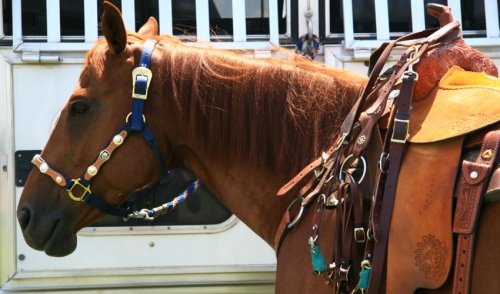{article.name}
Stay Informed
Tack Care Tips

- Share this:
- Share on Facebook
- Pin on Pinterest
- Tweet on Twitter
Good quality tack is an expensive investment, but without proper care that investment can quickly wither away to damage, mold, stains and other problems that are not only unsightly, but can be unsafe for both the horse and rider. Proper tack care is not difficult, however, and every rider should take steps to keep tack in top condition.
Use Is Abuse
Even casual, easy use can put tremendous stress and strain on tack. Dust, sweat, dirt, saliva and hair can all be abrasive and cause damage if left to accumulate, and dirty tack is less comfortable for the horse, which can cause irritability and discipline problems. The pressures and stress of riding can cause leather to stretch or warp, and buckles can loosen or ties become frayed. If tack is properly cared for, however, these problems can be avoided.
Easy Tack Care
Every rider should take steps to care for tack after every ride, and it's easy to minimize any damage or problems.
- Wipe down all parts of the tack after every ride, using a clean, dry cloth to remove dust and dirt. If the tack is exceptionally dirty – such as after a muddy trail ride – use a slightly damp cloth.
- Thoroughly clean the bit after every ride, removing any caked on sweat or saliva. This will help the bit be more comfortable for the horse and will minimize the spread of any germs.
- Use a glycerin-based, leather-safe soap (check for tack manufacturer's recommendations) to thoroughly clean the leather at least once a season, or more often if needed.
- Condition leather regularly by applying leather-safe conditioner or oil while the tack is still slightly damp. This will keep the leather supple and minimize cracking.
- Shake out saddle pads and blankets after every ride, and hang them neatly with plenty of air circulation to dry thoroughly. Wash pads and blankets regularly as well.
Storing and Organizing Tack
To keep tack at its best, it is necessary to organize and store equipment properly to avoid inadvertent damage. A good tack room is essential, and should be…
- Clean – If the room is dusty or dirty, debris will accumulate on the tack as well. Check for mice droppings and eliminate rodents from the room, and keep the shelves and floor clean. If tack is to be stored for long periods, such as between show seasons, lightly cover the equipment with newspaper or fabric so it can breathe but will be protected from dust.
- Dry – A humid or damp room will encourage mold and fungus growth that will deteriorate and discolor leather. A cooler room is better and will have less moisture, or a dehumidifier may be necessary to control the room's climate.
- Dark – Sunlight can degrade and discolor leather, so tack should always be stored out of the sun. If the room has windows, store tack away from sunlight, install shades or be sure leather tack is covered for protection.
- Organized – Use horse or owner nameplates to keep tack in its proper place, and avoid overcrowding hooks or shelves with multiple pieces that can tangle. This will also help any missing pieces be noticed much more quickly.
- Secure – Tack is expensive, and a tack room should have a sturdy lock. Surveillance cameras and security lights are good investments as well, and a tack record can help identify any misplaced or stolen items right away.
With a small amount of foresight and preventative care with proper cleaning and storage, tack can be at its best for many years, no matter how frequently it may be used.
Special Offers
We are constantly adding new specials to our site. Be sure to check back often!




Comments